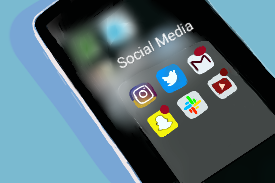The underestimated addiction that you and I face
May 4, 2021
When was the last time you looked out the window? Or left your house not because you had to, but to go on a walk? It’s possible that you haven’t done either of these things in a while. For the average person, the day begins with checking their phone the moment they wake up and it’s the last thing they see before they go to sleep. Rochi Zalani at Elite Content Marketer says that most people check their phones 58 times a day, and due to quarantine, can we really be surprised at that number? Media addiction has become such a big issue that is often overlooked regardless of its seriousness.
The fear of missing out plagues our mind once you see the flashes of light on your screen, taunting you with the indication that something is happening and you aren’t a part of it. But once you connect with the online world, disconnecting from it is not as easy as it seems. Zalani explains how 70% of the time that you give in to the notifications popping up on your screen, you interact with them for about two minutes. But they can start off a chain reaction. Screen time sessions start within three minutes of each other 50% of the time. This ends in the constant switch between your phone and whatever you are supposed to be working on. Social media is a huge problem that distracts you and causes you to disconnect from the real world.
This problem has become much more prevalent during the spread of COVID-19, which forces most people to stay indoors. Long gone are the possibilities of spending time with your friends, and the obvious method of staying connected has become to pick up your phone. When quarantine first started, it was presented as the ideal opportunity for families to spend time with one another, to pick up a new hobby or read some new books. But that facade soon crumbled and we all just picked up our phones.
What can we blame for this problem? The problem doesn’t reside in one single company or app, more in an industry that is competing for your attention and is responsible to its stakeholders to stay profitable. ‘The Social Dilemma’, a Netflix documentary about the dangers of media addiction, mentions that the goal of these industries is to manipulate your attention for the longest possible time, and they do this by enticing you with constant notifications for every message, like, and comment. Like a puppet-master controlling a puppet, they can send recommendation after recommendation based on your preferences that they track every second, causing you to stay online.
Forbes mentions how social media plays a leading role in many problems that teenagers face daily, such as anxiety, lack of self esteem and lack of focus, and for many students like me, it has gotten only worse with the introduction of online school. With a screen between you and your classmates, what’s stopping you from tuning out from the whole lesson and picking up your phone?
The reason that we even pick up our phones goes way deeper than, “I just want to see what’s happening” and is controlled by artificial intelligence (A.I.). A.I. is much stronger and accurate than any human-made algorithm and it methodically calculates how it can get you to stay on your phone longer. The A.I. analyzes how long you interact with every post, what posts catch your attention, what ads you skip, what profiles you spend time on and creates a personalized feed for you. You might think that this is a great thing, as your feed is full of things that interest you. What you don’t know is that this is simply a tool to capture and sell your attention. With artificial intelligence controlling the algorithm, morals aren’t even apparent, after all, it has no care for your feelings and the possible impacts on your health. Large social media companies shouldn’t put so much responsibility in the hands of A.I., when the average person is using these platforms every day, not knowing what they are getting into.
If you ask a teenager if they think their screentime is a problem, some of them will acknowledge the problem, but others will downplay the seriousness, proclaiming: “I could get off if I wanted to.” You can tell yourself that, but it is an unfair battle when you are competing with an algorithm determined to steal your attention.
According to an article by Harvard University researcher Trevor Haynes, when you get a social media notification, your brain sends a chemical messenger called dopamine along a reward pathway, which makes you feel good. This is the same process that happens with drugs and alcohol. By staying connected online, you really are making it harder for yourself to be connected to the real world.
There will always be people who discount the seriousness of this issue. They might claim that once you’re online you can’t leave. It’s an all or nothing situation, and because everything is slowly moving online, it’s nearly impossible in this day and age to stay connected otherwise. You might believe this, but people lived happily for centuries without social media. Even now with social media there are still plenty of things that you can do that are enjoyable, with others, or alone. New York Behavioral Skills unravels a common misconception about social media creating connections. They point out that many say that social media helps create friendships and makes you less lonely, but in reality it is much less sincere and can lead to a lack of social skills. Social media is a free platform, but you are paying in other ways by sacrificing many vital skills.
When tracking my own screen time on Instagram, an app that I barely used before quarantine, I was shocked when I learned that my 10-minute screen time had shot up to almost four hours daily. Last school year, I was able to live without my phone for hours on end, only checking it when I was done with my work. This year I find myself struggling to stay off it for more than 15 minutes.
Only when you realize the problem can you begin the process of solving it. You can turn notifications off for social media apps to reduce the number of reasons why you pick up your phone. You can set screen-time limits for yourself; as much of an inconvenience that they are, in the long run they do help you. You can also find more activities and hobbies to partake in that you look forward to, to stop you from running to your phone at every possible moment. In an article written by researchers at Brandman University, they conclude that physical exercise is an effective intervention in mental health care. Aerobic activities like jogging, swimming, cycling, walking and dancing have been found to reduce anxiety and depression. Or you can start with a simple reminder, putting down your phone and remembering to look out the window.




